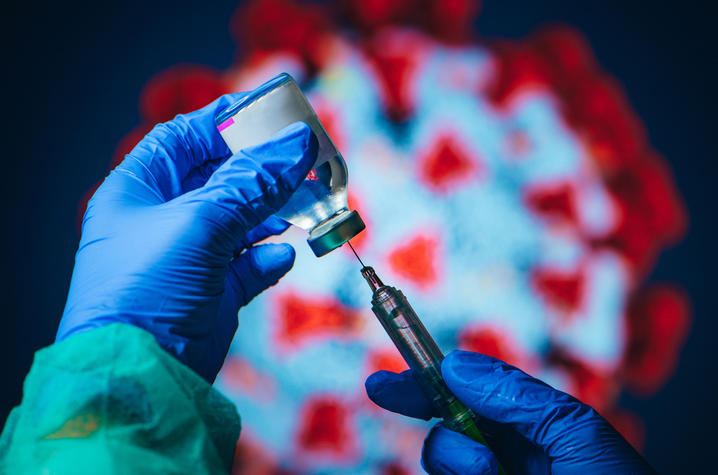What You Should Know about the COVID-19 Vaccine

The University of Kentucky Public Relations & Strategic Communications Office provides a weekly health column available for use and reprint by news media. This week's column is by Dr. Charles P. Shaw, primary care physician at the UK HealthCare department of Family and Community Medicine.
LEXINGTON, Ky. (Dec. 18, 2020) — The Federal Drug Administration (FDA) approved the Pfizer/BioNTech vaccination for the novel coronavirus 19 (COVID19) on Dec. 11 and the Moderna vaccine is still pending approval. Both vaccines use the recombinant messenger RNA technology that allows your immune system to form antibodies against COVID-19. It is important to understand that the vaccine does not have all the “parts” of the full, live or active virus and one cannot contract COVID-19 from taking the vaccine.
The vaccine does have the potential of causing local swelling, fatigue, low-grade fever, aches and headaches. These are signs that your immune system has been stimulated by the vaccine and is starting to respond appropriately by making antibodies. Sometimes people will experience these symptoms after a vaccine and assume that the vaccine made them sick. Rest assured that such symptoms mean the vaccine is doing its job. These symptoms are mild in comparison to what one would experience if they were infected with the live virus. Acetaminophen or ibuprofen should help these symptoms, which should last no more than 1-2 days, if experienced at all.
Both vaccines will be given as a 2-shot series. The second shot will be given approximately 3 weeks after the first shot. It takes approximately 4-6 weeks for our immune system to start making antibodies, which means the vaccine will be protecting your body approximately a week after the second shot.
It is important to understand that simply because we have received the vaccine does not mean that we can stop wearing masks, practicing social distancing, and washing our hands frequently. We are still learning how COVID-19 can be transferred from one person to another. Just because you have had the vaccine, and have antibodies in your blood, does not mean that you cannot physically transport the virus to another person. If you breathe in and get COVID-19 from aerosolized droplets from the air, you could potentially cough and release that virus back out in the respiratory droplets and get someone else sick. In the same sense, it is not responsible for one to think that just because they have had COVID-19 and have recovered, that they do not need to take the other precautions.
The social ordinances of masking, social distancing, and frequent cleaning of the hands will continue and should not be ignored just because a person has had the vaccine or had a previous COIVD-19 infection. Please continue to care for one another, and respectfully follow the CDC, state, and other regulatory guidelines such as masking, social distancing and handwashing. Remember, lives are still at stake, even after being vaccinated, and even after a previous infection.
As the state’s flagship, land-grant institution, the University of Kentucky exists to advance the Commonwealth. We do that by preparing the next generation of leaders — placing students at the heart of everything we do — and transforming the lives of Kentuckians through education, research and creative work, service and health care. We pride ourselves on being a catalyst for breakthroughs and a force for healing, a place where ingenuity unfolds. It's all made possible by our people — visionaries, disruptors and pioneers — who make up 200 academic programs, a $476.5 million research and development enterprise and a world-class medical center, all on one campus.




